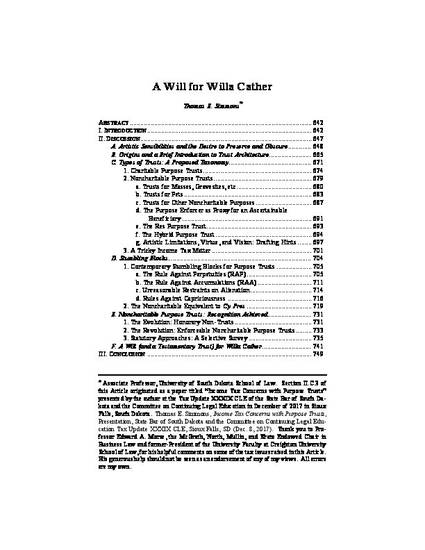
Article
A Will for Willa Cather
83 Missouri Law Review 641
(2018)
Abstract
Artists hold their creative works dear. Whether paintings, poems, or songs, their human creators treat them with special care and often desire that same care be exercised after death. Some may wish to ban the use of a song in a television commercial. Others may wish to stop their novel from being turned into an animated Disney movie. But directing particular uses of property from the grave can be met with several objections and legal impediments. The objections sound in alarmist responses to “dead hand control.” The impediments include the Rule Against Perpetuities, uncertainty, capriciousness, and the repugnancy of restraints on alienation. This Article considers these and other recurring objections and impediments in one particular context and with one particular variety of creative works in mind: an author’s unpublished and private letters to her friends. A mechanism for achieving an artist’s restrictions over the use of her creative works after death is introduced in the form of a purpose trust. Purpose trusts are typically utilized by pet owners to ensure the continued care and preservation of their pets after the owner’s death. Purpose trusts are unique in that they lack ascertainable beneficiaries to enforce the trustee’s duties. Many purpose trusts do not qualify as charitable trusts, which can be enforced by the state attorney general’s office. Instead, a private “enforcer” must be provided. Here, a noncharitable purpose trust designed to restrict access to an author’s private correspondence is introduced: a testamentary trust hypothetically created under the terms of the Last Will and Testament of the celebrated twentieth-century American author Willa Cather.
Disciplines
Publication Date
2018
Citation Information
Thomas E. Simmons, A Will for Willa Cather, 83 Mo. L. Rev. 641 (2018).
